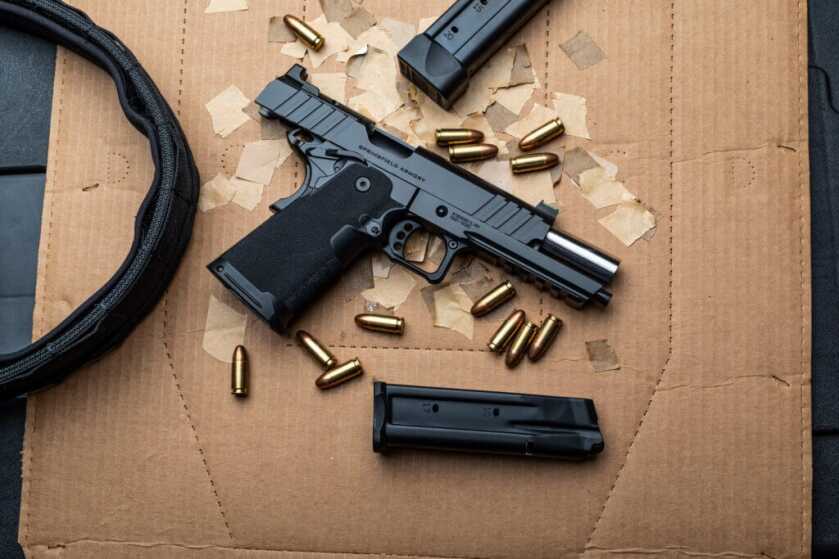
Estimated reading time: 17 minutes
Throughout history, many firearm platforms have come and gone. Very few see continued use for multiple decades to come. One such firearm that has is the legendary M1911.
The M1911 is considered by many as the pinnacle of semi-automatic pistol design. Its tight tolerances, incredible single-action trigger, and timeless look have made it one of the most popular handguns in the world. Its popularity has grown so much that multiple companies manufacture their own versions, and it has even seen wide use in the competition scene.
Table of contents
In the last 10 years, a variation of the 1911 pistol has taken over the competitive space and the everyday carry and duty scene. This pistol is the double-stack variant of the ever-popular 1911, known as the 2011.
The 2011 is certainly one of the most popular pistols available today, and it’s no wonder why that is. It keeps the similar ergonomics and fantastic trigger of the 1911 but has a larger magazine capacity and is commonly chambered in the effective 9mm round. The question has to be asked, is the 1911 dead?
Let’s Break it down!
Available on GunsAmerica Now
1911s, A Brief History
Developed by John Moses Browning in the early 1900s, it was adopted by the U.S. Military in 1911, hence the name M1911. It stayed in service as the military’s main service pistol until 1986. Before it was replaced, it earned a great reputation as one of the most reliable and durable pistols of its time.
The battle-proven design of the 1911 has a strong track record in austere conditions. It is a strong contender for use in multiple environments. In fact, some special forces groups are still using the 1911 and other variants of it like the M45A1, long after its replacement as our main service pistol.
Today, there are dozens of manufacturers making their own version of the 1911. It isn’t going away anytime soon, but there has been a shift in demand as the 2011 has risen in popularity. As popular as the two are, what are the major differences between them?
1911 vs. 2011: What are the differences?
The fundamental differences between the two types of pistols are the caliber and magazine capacity. The 1911 is most commonly chambered in .45ACP and has a standard magazine capacity of 7 to 8-rounds. Its single stack design gives it a slim grip and small capacity compared to what the standards are today.
While similar in design, the 2011 is a double-stack pistol. The double-stack magazine greatly increases the magazine capacity. Most 2011s have a standard capacity of 17-rounds or more. It’s most often chambered in 9mm. Competition magazines like the ones used in 3 gun are limited in length but still hold 22-24 rounds of 9mm. There have, however, been iterations of the 2011 chambered in different calibers like .40S&W, 38 Super, 10mm, and .45ACP, but more often than not, you’ll likely find models in 9mm.
2011s are also more modern in their widespread optic mounting options. Some 1911 manufacturers have optic cuts or mounting plates. It isn’t as common though, and is usually done as an aftermarket upgrade.
Frames
It’s also worth noting that some 2011 models use polymer or aluminum grips. Most traditional 1911s feature forged steel frames, though some manufacturers offer aluminum frames as an option. It’s entirely up to user preference as to which is best, but keep in mind that the heavier steel frame is a great option for competition. The weight will reduce recoil, while the lighter aluminum or polymer will weigh less. This makes it easier to carry for defense; which we’ll go over more later.
Both are great platforms, and the 1911 and the 2011 still have their advantages over each other. Depending on your purpose for owning one of the two, it’s important to see how they stack up against each other.
Pros and Cons of the 1911
There is a lot that makes the 1911 as great as it is, but it isn’t without its flaws. Minor changes have been made throughout the years to make it more accessible to modern enthusiasts. The design has remained largely the same for over a hundred years though. So, what is it that’s so great about it? What’s not so great?
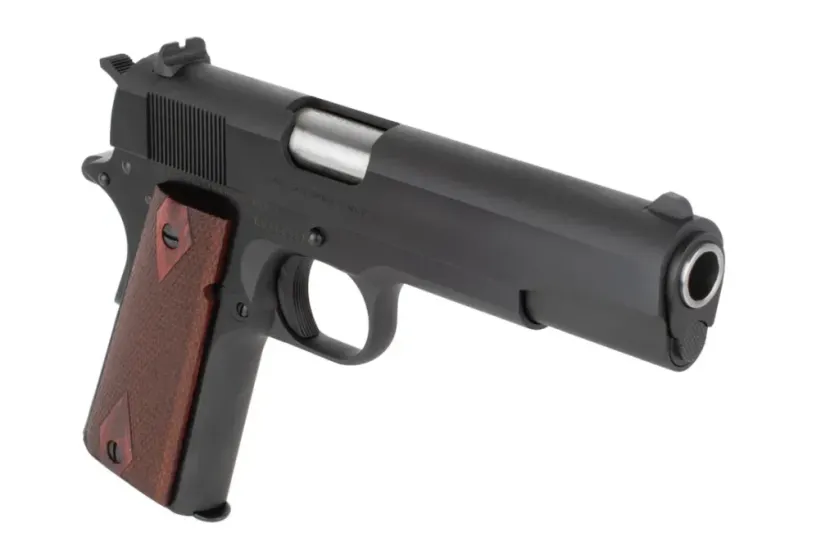
Pros of the 1911
For starters, the 1911 is an accurate pistol. Most modern manufacturers of the 1911 include match grade, cold hammer forged barrels. Not only are these barrels accurate, but they’re also durable enough to withstand tens of thousands of rounds with proper maintenance and use. Besides the high-quality barrels, their forged steel frames, while heavy, help to reduce recoil. This is especially important as .45ACP isn’t known for being a soft-shooting cartridge.
One thing you’ve probably heard by now is how good the 1911 shoots. This is partially because of the trigger. The 1911’s trigger has reached a legendary status in the gun industry. Many reviewers, influencers, and gun-builders often use it as a point of comparison when working with other pistols. 1911s are a hammer fire pistol, but they don’t have a double action. Where a double action pulls the hammer back with each trigger pull, the 1911s single-action trigger requires the hammer to already be cocked.
As a direct result, its single-action trigger pull is very crisp with a short reset. Anytime you’re shooting a 1911, it’s a good time.
Finally, while this isn’t a plus in terms of how it shoots or how it’s built, it’s a great-looking firearm. Believe it or not, style-points count. The 1911 is one of the most classic and timeless firearms available today.
Cons of the 1911
No gun, no matter how prolific, is without its flaws. While a successful pistol, the 1911 is still a design that was first implemented over 100 years ago. New firearms technology that’s used today simply makes it outdated.
To start, the magazine capacity is small compared to modern firearms. Like we said before, the 1911 has a standard capacity of 7 rounds. Though some models can hold more depending on the size of the frame, usually 8 rounds in this case, it’s a very low capacity compared to most modern firearms available.
Next, while the steel frame enhances durability and reduces felt recoil, it is heavy. Unloaded, it weighs close to 2.5 pounds, and with a full magazine of .45ACP, it can weigh upwards of 3 pounds or more. Compared to something like the GLOCK 19, which weighs under 2 pounds when loaded with twice as much ammo, the 1911 is a heavy pistol.
Another con of the 1911 is its feed angle. The extreme feed angle in some 1911 models means they can’t reliably feed some types of hollow point rounds. There are ways to overcome this issue. High-quality 1911 magazines with enhanced followers and feed lips can provide enough support to overcome the feed angle. It’s not something that every 1911 struggles with, but it’s important to keep in mind when choosing ammunition.
Customization
Lastly, if you’re looking to add custom/aftermarket components to your 1911, it’s not as easy as one would assume. While most manufacturers of the 1911 make “traditional” or “Mil-spec” models, they aren’t really built identically to the original M1911. Instead, most are clones of the government model issued to servicemen and women at the time. Though this isn’t an issue for those wanting a traditional style 1911, it becomes an issue for those who want to make customizations to their pistol. Each manufacturer has their own design with no two manufacturer’s pistols being 100% similar. For example, a Springfield 1911 won’t have the same fitment as SIG Sauer or Colt 1911.
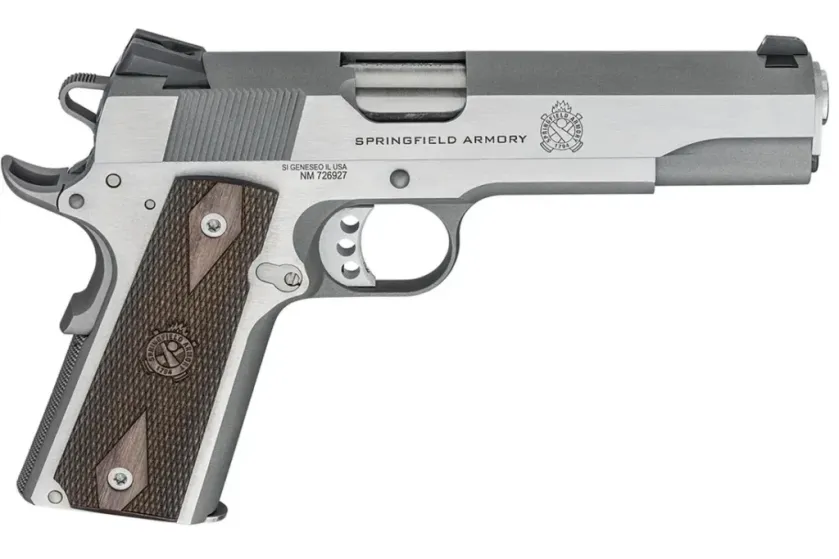
When shopping for aftermarket parts like trigger and hammer springs, slides, and safeties, you’ll most likely see a note on the page labeled “gunsmith finish/fitment”. Whenever you see this note, it means the part may require slight fitting to work with your pistol. some producers make parts for specific make and models of 1911s. But not all do, and it’s common for most parts to require some form of fitting. Keep this in mind if you plan on doing custom work on a 1911 in the future.
It’s also worth noting that there are two main types of 1911s, the series 70 and the series 80, which can have different component compatibility. Though they are similar structurally, the Series 70 lacks some of the modern safety features found on the Series 80. For instance, the series 70 doesn’t have firing pin safety. It has an arched mainspring, and it doesn’t use the same trigger as the series 80. Most competition shooters prefer series 70 triggers. Though it is entirely up to user preference as to which series is better, it’s important to research the manufacturer’s website and manuals to be certain of which model series you have, as it will affect your aftermarket parts availability.
Pros and Cons of the 2011
Building on the solid foundation that is the 1911, the 2011 is a great pistol that can be used in a variety of applications. But just like its 100+ year old predecessor, it too has its pros and cons.
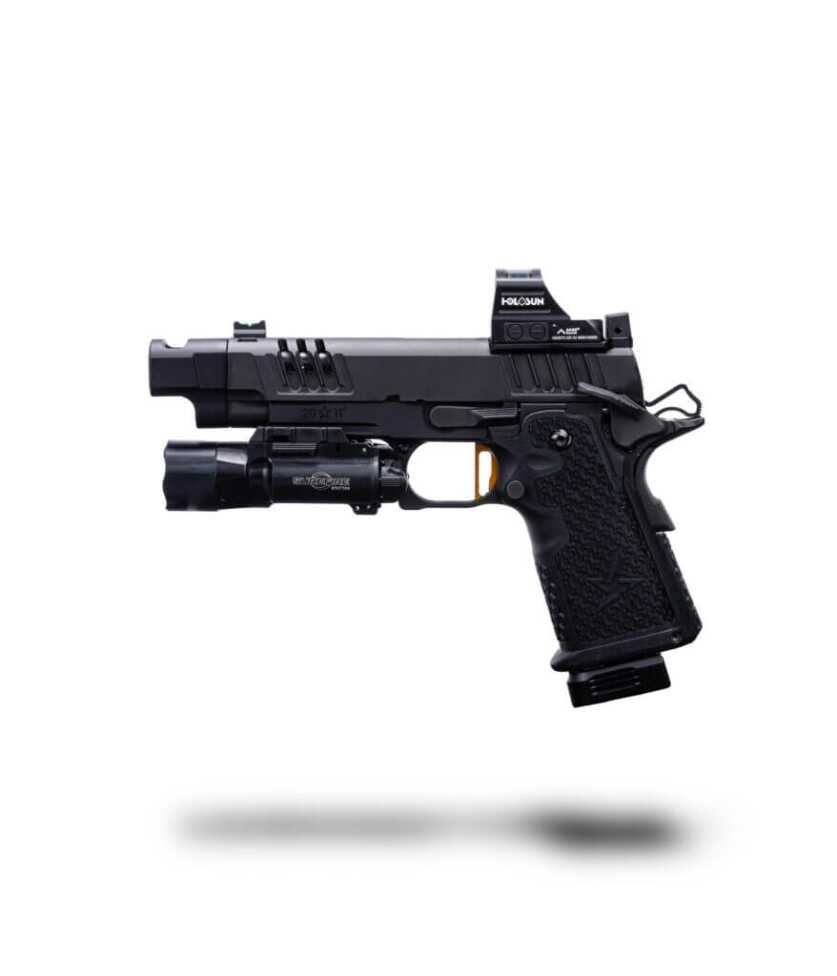
2011 Pros
Just like we said before, the 2011 is built on the strong foundation that is the 1911. It does a good job of incorporating the best features of that platform while still modernizing it enough to make it a class of its own. The trigger on the 2011, while not identical in dimensions, keeps the same feel as the traditional 1911 trigger and shares some of the same components. It has minimal travel, a crisp break, and a short reset.
Depending on the make and model, 2011s can be much lighter than 1911s. Though you can purchase 2011’s with steel frames, many use lighter-weight materials like polymer in the grip. This makes it easier for concealed carry, while higher-end and competition models use steel. All of this essentially gives you a lightweight, high-capacity alternative to the 1911, while keeping most benefits.
New production 2011 pistols have a lot of customization options. With their popularity growing, more and more manufacturers are developing their own variants of the 2011. Companies like Staccato, Stealth Arms, and Taran Tactical offer different 2011 models or aftermarket components with specific fitments that can upgrade your shooting experience.
2011 Cons
As cool as they are, 2011s aren’t without their flaws. For starters, most of the popular 2011s on the market cost much more than most other pistols on the market. They are made with high-quality components, usually with specific purposes in mind. So they typically range from $1,500 to upwards of $4,500+.
The size of these guns can be an issue as well. Most models of the 2011 are full-sized, and when they have optional extras like flared magwells, enhanced grips, and full length dust covers, they can be pretty bulky. If you’re looking to conceal carry your 2011 it may not be a comfortable option. Size and build play a part, and you could be prone to printing. That being said, many of the 2011 builders will customize every aspect and certainly anything could be achieved if you throw enough money at it.
Best 2011 Manufacturers
Compared to the 1911, there just aren’t as many manufacturers producing the 2011. Fortunately, the number is growing along with the pistol’s popularity. There are increasingly good options to choose from. Even better, we have a list of some great ones below:
Staccato 2011
Originally going by the name STI, the Staccato 2011 is one of the most popular 2011 pistol manufacturers around. The originator of the 2011 design that we know and love today, they were already popular when they started making pistols. Then the Taran Tactical custom STI Combat Master 2011 was featured in the movie John Wick: Chapter 3. After that, they skyrocketed to an even higher degree of popularity.
READ MORE: Staccato 2011 P Delivers Amazing Performance
Now, Staccato 2011 models are one of the go-to brands for those looking to own a 2011. Models like the Staccato P are some of the most popular ones they offer. Just like the Platypus, Staccato pistols are easily customized from the manufacturer’s website. They offer many customization options like engraving and laser etching. Even added competition components like flared mag-wells and oversized latches, as well as different barrel coatings and Cerakote.
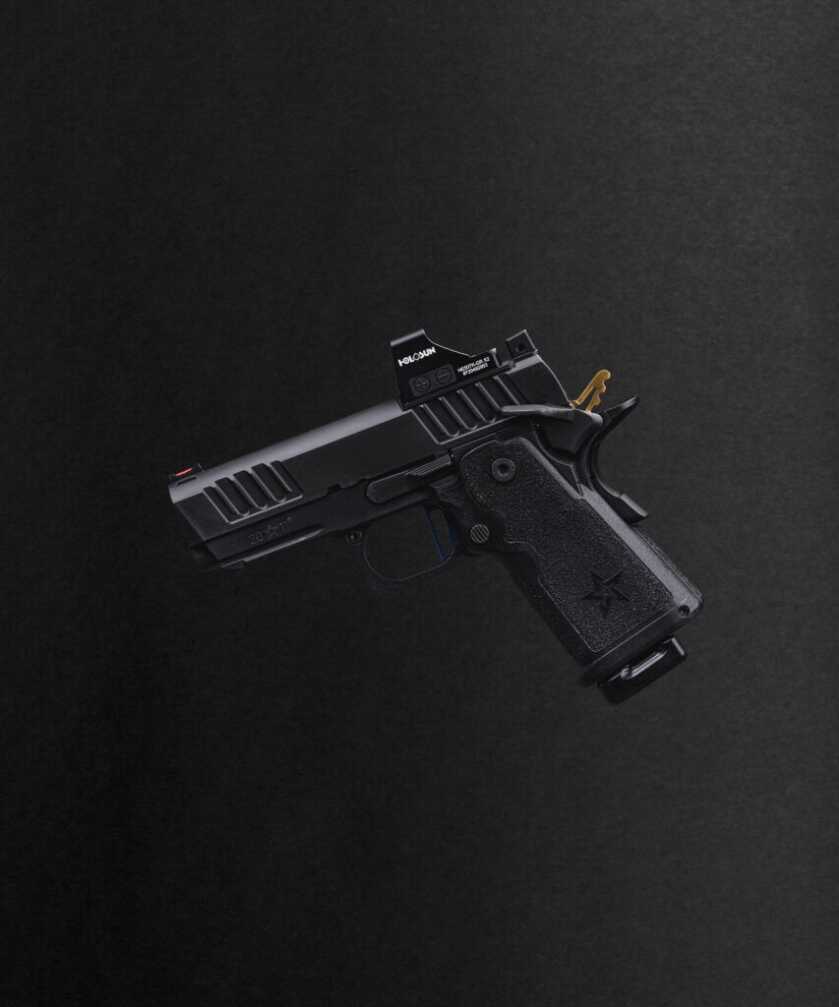
Staccato 2011 Variants
Staccato offers five variants of the 2011: the CS, C2, P, XC, and XL. The CS and C2 pistols are compact and built with concealed carry in mind. Lighter options with 3.5-inch and 3.9-inch barrels respectively. The Staccato P is a duty-grade pistol built for use as a defensive carry gun. Carried by over 1,300 law enforcement groups, it’s a full-size pistol with a 4.4-inch barrel that comes with two 17-round and one 20-round magazine. Lastly, the XC and XL are competition pistols; they come standard with Dawson Precision recoil systems, 17 and 20-round magazines, and 5-inch and 5.4-inch barrels respectively.
The Staccato lineup has some great options for all purposes, but keep in mind that Staccato 2011s aren’t the most budget-friendly options on the market. With models starting at $2,299, they offer some of the best mid-to-high-tier 2011 pistols available.
We want to point out that “2011” belongs to Stacatto 2011. You’ll likely see other brands use the term “Double-stack 1911” or they will simply refer to it as a 1911. It varies from brand to brand. 2011 among many shooters however has reached that point where it refers to a double stack 1911 and not necessarily an STI.
Stealth Arms Platypus 1911
While it isn’t like other 2011s, the Platypus 1911 is one of the newest and innovative double stack 1911 style pistols on the market. Made by Stealth Arms, they are fully customizable from their website. Unlike other 2011s, the Platypus is the only one on the market that uses GLOCK 17 style magazines. 2011 magazines aren’t cheap, and when you’re stocking up, the cost of your cart adds up quickly. GLOCK magazines are some of the most readily available and low-priced magazines on the market. OEM GLOCK mags are inexpensive, but many other companies produce GLOCK-compatible magazines as well.
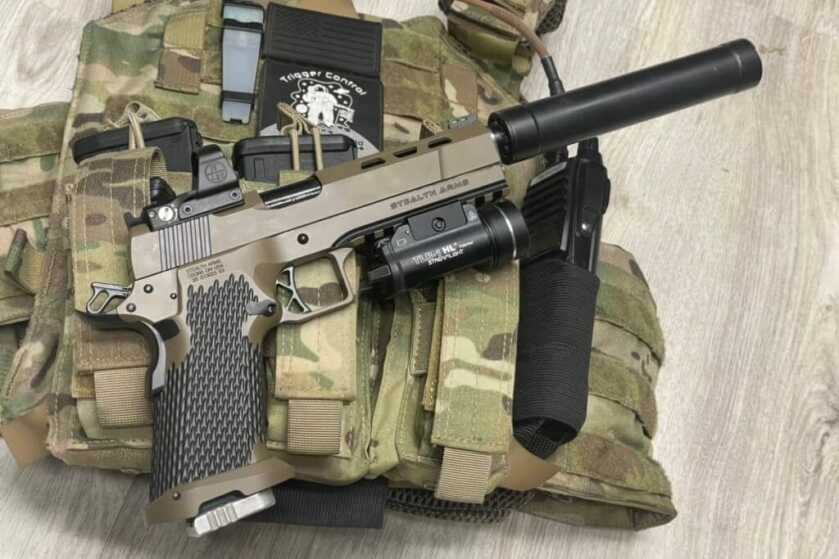
The Platypus is a great option for those looking to own a feature-rich 2011 at a fair price. It has a match-grade stainless steel barrel and is available in 2 sizes, a 5-inch Government model and a 4.25-inch Commander model. The frame is made from durable 7075-T6 aluminum. The slide is made from carbon steel. It’s also incredibly easy to customize.
READ MORE: Review: 1911 That Takes Glock Mags?! Meet the Stealth Arms Platypus
Customizing the platypus can be done on Stealth Arms’ website. Depending on how you configure yours, it can weigh anywhere from 26 to 32 ounces when unloaded and 36 to 42 ounces when loaded with a full magazine. With dozens of parts combinations available from the manufacturer, the Platypus is one of the coolest utilitarian pistols we’ve seen in recent years.
Taran Tactical Innovations Pit Viper
Built from the legendary team at Taran Tactical Innovations, the TTI Pit Viper is one of the most sought after, competition-grade, 2011s available. The Pit Viper Pistol was created specifically for the movie, “John Wick: Chapter Four”, making it not only a great race gun but a premium collector’s piece as well.
Like the popular TTI Sand Viper, the 9mm Pit Viper is built for competition and has a ton of features that make it great for the job. A higher-end model 2011, it comes standard with a 5-inch DLC coated match grade barrel with a single port compensator, precision cut slide and frame, and an Extreme Engineering Fire Control Group with a 1.75-pound to 2.25-pound trigger pull. Not only does TTI include their carry magwell, but they also include their enhanced beavertail and safety, and TTI custom grips. All the added components built into the Pit Viper make it an exceptionally reliable and accurate pistol that’s ready to compete out of the box.
Out of the listed 2011s we’ve mentioned, the TTI Pit Viper is the most expensive. It is by no means a beginner or budget-friendly option and is tailored to those who want a high-performance, ready-to-use pistol for competition. The Pit Viper 2011 starts at $6,999.99, but for all that’s included, it’s one of the best competition-ready 2011s on the market.
Honorable Mentions
The V9 from Fowler Industries is another great option for those looking for a high-quality 2011 pistol. It comes standard with a hand-fit slide and frame interface, tri-top hybrid slide profile, aluminum frame, a proprietary optic plate, and their enhanced aluminum Zero trigger with a flat face. It also comes with a lifetime transferable warranty. Priced at $4,500, they are a fantastic high-tier 2011.
Another solid 2011 option comes from Combat Precision. Combat Precision produces high-quality custom 1911 and 2011 pistols. The pistols they offer are custom and usually made to offer, though they do offer additional gunsmithing services as well. For those looking for complete options, Combat Precision does release small batches of pistols in limited quantities, though they don’t do it too often. Their M5 was a limited production run that came fitted with their H1 alpha hammer, slide stop, KKM match fit barrel, 7075 aluminum frame, and a direct optic mount fitted for the RMR footprint. They’re a great option for those interested in doing custom builds or making upgrades to their current pistol.
There are other great 2011 style pistols available from manufacturers like Springfield, Bull, and Triarc Systems. These are all fantastic brands to consider if you’re looking to get a 2011. Just remember to do your research on each brand and model to better determine which one is the best fit for you.
Is the 1911 Dead?
The dreaded question still is yet to be answered. With the 2011 quickly becoming one of the most sought after and popular pistols, are 1911s dead? While a strong contender, we don’t think that the 1911 is going anywhere, anytime soon.
There aren’t many pistols that have such a dedicated and growing fanbase quite like the 1911. Just like we said before, they are timeless. As new guns come to the market, the 1911 stands strong on its own. While the platform is outdated and lacks some of the modern comforts we’ve come to enjoy seeing in pistols in recent years, the 1911 sees its fair share of quality-of-life changes from the companies that actively produce it. New features like enhanced triggers, safeties, upgraded recoil systems, and optic cuts have made their way to the platform.
The Colt 1911
A favorite of many enthusiasts is Colt. They have continued to be one of the leading producers of the 1911. Since Colt is the original producer of the M1911, it’s no surprise that they’re a fan favorite.
While Colt continues to make traditional 1911s, they also make updated models that are tailored for different uses like concealed carry, defense, and competition. But Colt isn’t the only manufacturer making upgrades to the 1911. Springfield, SIG Sauer, and Kimber are only a few examples of those that have pushed the limits for the 1911 design.
SIG Sauer currently offers four variants of the 1911, while Springfield Armory offers over a dozen variants. Kimber has remained a popular option throughout the years, and like the Staccato and Pit Viper from Taran Tactical, they’ve also become a household name with gun owners.
With so many options available and manufacturers making consistent upgrades to the platform, the 1911 is still a great pistol that can be used in many different applications.
Conclusion
While the 1911 is commonly known as the tried-and-true pistol design that can never truly be replaced, the 2011 is the modern alternative that keeps the benefits of its 100+ year-old counterpart while providing modern controls and comforts.
Though it seems that the two platforms compete, they each have their benefits over each other in the modern firearms scene, while dedicated enthusiasts continue to push each respective design to the limits. For competitive use, the 2011 will probably be more beneficial though there are race-ready 1911s. If you want a slimmer option for concealed carry or defense, the traditional styling of the 1911 may better suit your style.
It’s safe to say that both can be great options for enthusiasts. So even though the 2011 is taking the firearm industry by storm, 1911s still have their place and aren’t dying off anytime soon.
*** Buy and Sell on GunsAmerica! ***

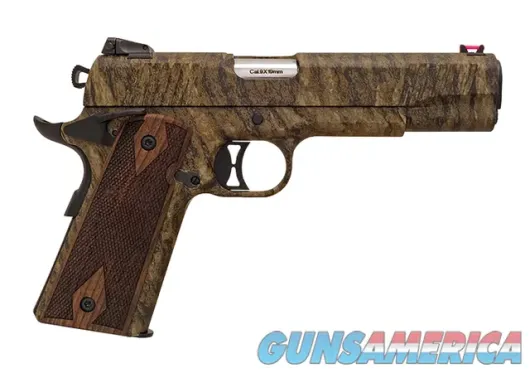
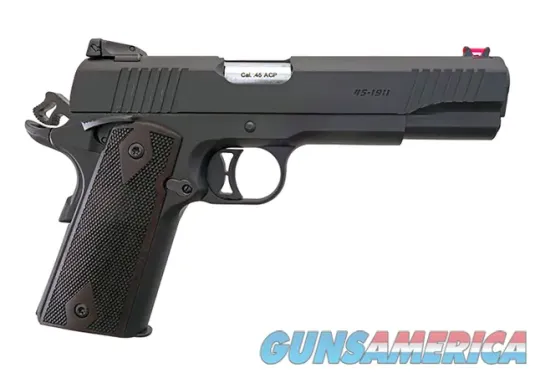

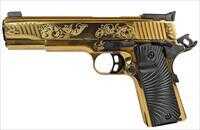
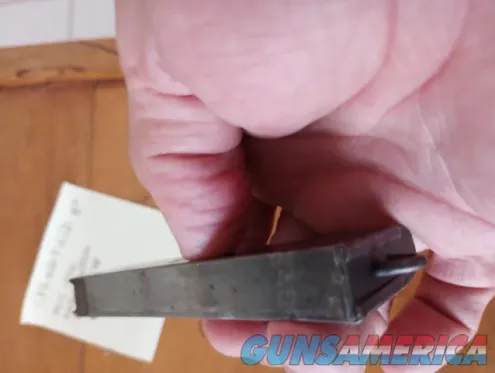
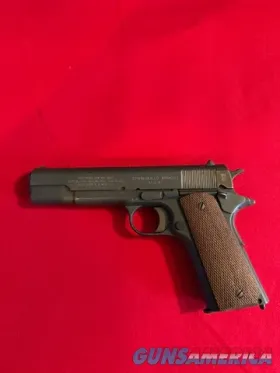
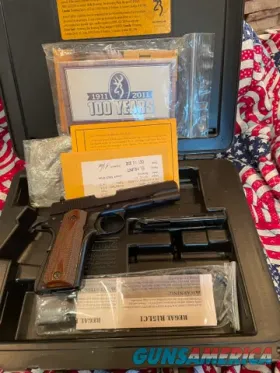
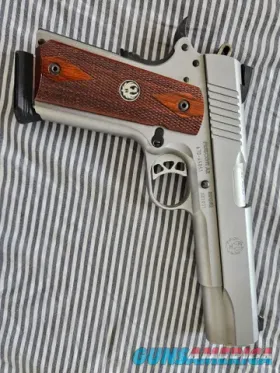
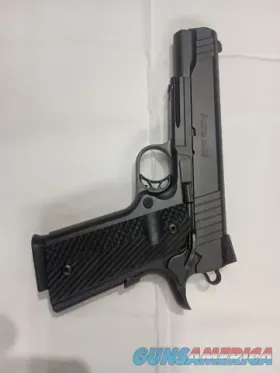
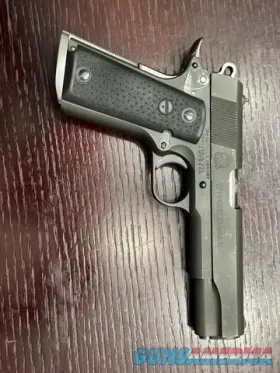
When I can’t get to the range to shoot my 9. I went and got me a 1911 style gun chambered for 4.5MM ✊😏😁https://www.youtube.com/watch?app=desktop&v=z5oCoFWxuYY
Are these 2011 Manufacturers US companies?
Nice to have choices. I see no need for a double stack 2011 but I’m glad they are sold.
What is the difference between a 2011 and what Para Ordnance did decades ago?
It’s too bad someone like Para-Ordnance didn’t start making double stack “2011’s” 30 years ago. That would have really been something!
Are you serious or being sarcastic? Para-Ordinance started making double stack 1911s in 1990, 33 years ago!
Why do gun wonks continual refer to a “dust cover” on the 1911, when there is no such thing. On Browning’s Patent 984,519, dated Feb. 14, 1911, Page 3 lines 111-119, he refers to the lower front of the gun as the “semi tubular extension” of the “frame”. Nowhere does Browning call this area the dust cover.
Cause you cant be a Gen- U- Wine gunwiter without using trendy jargon to impress the cool kids.
🫵😁
Why do gun wonks continual refer a “dust cover” on the 1911, when there is no such thing. On Browning’s Patent 984,519, dated Feb. 14, 1911, Page 3 lines 111-119, he refers to the lower front of the gun as the “semi tubular extension” of the “frame”. Nowhere does Browning call this area the dust cover.
“In the past 10 years…”
I guess the author has never heard of Kimber and Bul Armory. I’ve owned my 14-round Kimber Polymer Custom for over 20 years–Long before the term “2011” even existed.
If you’re seeking a higher-capacity 1911 at a more reasonable price, you might want check out a pre-owned Para-Ordnance, the original hi-cap 1911. The earlier, Canadian-made models are the best-made and most desirable.
As to new users, I took my son, fresh out of the Marines to a gun show. He picked up a pistol and asked “Dad, what is this? It feels great in my hand!” It was a 1911 by RIA. I was a bit surprised he had not seen one but I realized he probably would not have seen/handled one as the military had gone to the M9, and I no longer had one in my collection. He ended up buying the GI model. I bought their match version a bit later. Great shooting gun. As to the ‘cons’ comment that the 1911 only holds 7-8 rounds, the whole idea behind the .45ACP cartridge fired from the 1911, was you only needed 1 round to stop a fight.
Yes, it is D.E.D. dead!
As are; 9mm, .308, .22LR, the Hi/High Power pistol, ALL revolvers, walnut stocks, .38 Spl., Lever Actions, Slide Actions, .45ACP, .45 Colt, .45-70…..
Pick up any ol’ old magazine and take your pick on what was supposed to be obsolete.
I feel foolish for even reading this click-baited article that is just an ad for the 2011 as though it’s another ‘breaking all the rules’…. ‘thinking outside the box’…. ‘this changes everything’ world shaker.
These articles demonstrate the folly when there is a lack of understanding of the basic premise. The 1911, for the good, bad, or otherwise has been declared dead many times and as obsolescent as it might be in some aspects: the market says otherwise. So if we think this 2011 is a new idea let me offer you this for thought: the Colt 1991…….
The Staccato with Glock magazines does sound good, but $2500 is too rich for me! While I’ll get yelled at for this, I’d think the High Power was more a pinnacle of semi-auto handguns than the 1911. I know the 1911 is an icon, at least for many in the US, and I have one (don’t have a High Power), but the High Power eclipses the 1911 in many ways while still being very similar.
Next time you write about 2011s, please include Wilson Combat’s excellent SFX9 and SFT9, which have all of the pros of the 1911, but have high capacity!
“Taken over the carry and duty scene”???? Not around here. I don’t know a soul carrying a 2011 of any brand. The rumor in these parts on springfield is they are unreliable (crappy mags and weak springs i hear)…and the rest cost way too much. As a LEO I see duty guns from all the surrounding depts (ours are sig 320s) but I see more Sigs, plenty of glocks and a few depts on Springy XDM’S. Civilians are mainly packing sig 365, springy hellcat, ruger lcp max (very popular ruger here) I carry one as my ankle gun on duty. And smith EZ racks for a lot of ladies and older people with hand strength issues. Your 2011 doesn’t exist in michigan at least as far as I see.
Sounds a bit too much like a shill for Stacatto. Doesn’t mention Wilson Combat or Nighthawk Custom, Chambers…wonder if they got a free Stacatto?
I had an STI in .40S&W and it was the most accurate pistol, I’ve ever owned. But there was a failure to go into battery in almost every magazine loaded. Got rid of it!